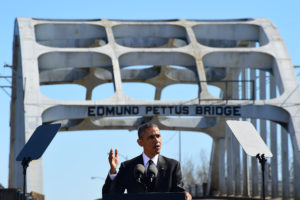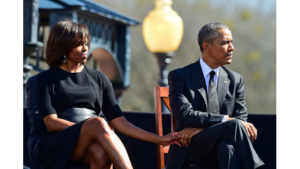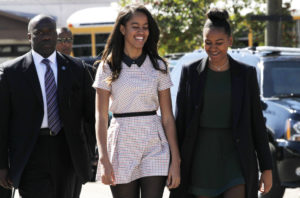
It is part of the job description for American presidents to give speeches that mark special occasions in America’s history. And it is a job that the current occupant of the White House happens to be very good at, using imagery and oratory to tug at the emotions.
Perhaps one significant sign that the nature of Black American life in the U.S. has shifted is the fact that some of the events that now get marked with ceremony by American government are occasions when Black people experienced suffering at the hands of American government and law enforcement. Some might call that progress—others might label it as hypocrisy.
So you get the president speaking to a gathering of lawmakers that includes Alabama Gov. Robert Bentley, to celebrate a moment in history when Black people were beaten and bloodied on the cruel orders of a racist Alabama governor, George Wallace.
And in addition to the Secret Service, part of the security force ensuring the safety of the Black president and the many Black people in attendance yesterday were members of the sheriff’s office for Dallas County, Alabama—the same sheriff’s officers who beat the protesters on the Edmund Pettus Bridge on March 7, 1965, on the order of Sheriff Jim Clark, who had recruited a horse mounted posse of KKK members to help with the security that day.
“There are places, and moments in America where this nation’s destiny has been decided,” the president said. “Many are sites of war – Concord and Lexington, Appomattox and Gettysburg. Others are sites that symbolize the daring of America’s character – Independence Hall and Seneca Falls, Kitty Hawk and Cape Canaveral. Selma is such a place.
“In one afternoon fifty years ago, so much of our turbulent history – the stain of slavery and anguish of civil war; the yoke of segregation and tyranny of Jim Crow; the death of four little girls in Birmingham, and the dream of a Baptist preacher – met on this bridge. It was not a clash of armies, but a clash of wills; a contest to determine the true meaning of America.”

It is the country whose founding was sparked by the notion that “All men are created equal,” passionately uttered by men whose personal holdings consisted of men and women held in bondage.
It is a country that could elect a Black man to the highest office in the land while its justice system seems incapable of securing justice for Black people murdered at the hands of law enforcement.
It is a country where Fortune 500 corporations can be overseen by Black CEOs while a large percentage of Black families have seen a regression in their financial fortunes since those protesters marched across that bridge in Selma.
“Because of men and women like John Lewis, Joseph Lowery, Hosea Williams, Amelia Boynton, Diane Nash, Ralph Abernathy, C.T. Vivian, Andrew Young, Fred Shuttlesworth, Dr. King, and so many more, the idea of a just America, a fair America, an inclusive America, a generous America – that idea ultimately triumphed,” he said.
Those words, used in describing America—just, fair, inclusive, generous—can’t help but be questioned by the generations that came after Selma. So much of the president’s speech spoke of a nation willing to change. But that willingness is being called into question in the America that swirls around the Black community in 2015.
“What could be more American than what happened in this place?” Obama asked of the crowd yesterday. “What could more profoundly vindicate the idea of America than plain and humble people – the unsung, the downtrodden, the dreamers not of high station, not born to wealth or privilege, not of one religious tradition but many – coming together to shape their country’s course?
“What greater expression of faith in the American experiment than this; what greater form of patriotism is there; than the belief that America is not yet finished, that we are strong enough to be self-critical, that each successive generation can look upon our imperfections and decide that it is in our power to remake this nation to more closely align with our highest ideals?”
Obama said the marchers moved the doors of opportunity to swing open not just for African-Americans, but for every American.
“Women marched through those doors. Latinos marched through those doors. Asian-Americans, gay Americans, and Americans with disabilities came through those doors. Their endeavors gave the entire South the chance to rise again, not by reasserting the past, but by transcending the past.
What a glorious thing, Dr. King might say.”
But many observers might wonder whether the courage of the marchers pushed open the doors for everyone but African-Americans, who still find themselves at the bottom of every measure of economic and social justice in America.
Of course the backdrop to the day was the idea of racial justice, of a people using their bravery and their blood to attempt to find any shreds of moral decency among the white people who witnessed their brutality. So the president couldn’t avoid the connection between the bridge and the streets of Ferguson, where Michael Brown was killed by a member of a police force that the Justice Department has concluded is rife with racism, in a city that callously uses bigotry as a revenue stream.
“Selma teaches us, too, that action requires that we shed our cynicism. For when it comes to the pursuit of justice, we can afford neither complacency nor despair,” he said. “Just this week, I was asked whether I thought the Department of Justice’s Ferguson report shows that, with respect to race, little has changed in this country. I understand the question, for the report’s narrative was woefully familiar. It evoked the kind of abuse and disregard for citizens that spawned the Civil Rights Movement. But I rejected the notion that nothing’s changed. What happened in Ferguson may not be unique, but it’s no longer endemic, or sanctioned by law and custom; and before the Civil Rights Movement, it most surely was.
“We do a disservice to the cause of justice by intimating that bias and discrimination are immutable, or that racial division is inherent to America. If you think nothing’s changed in the past fifty years, ask somebody who lived through the Selma or Chicago or L.A. of the Fifties. Ask the female CEO who once might have been assigned to the secretarial pool if nothing’s changed. Ask your gay friend if it’s easier to be out and proud in America now than it was thirty years ago. To deny this progress – our progress – would be to rob us of our own agency; our responsibility to do what we can to make America better.”
Obama said the nation didn’t need the Justice Department’s Ferguson report to tell us that racism is still alive and well in America.
“We just need to open our eyes, and ears, and hearts, to know that this nation’s racial history still casts its long shadow upon us,” he said. “We know the march is not yet over, the race is not yet won, and that reaching that blessed destination where we are judged by the content of our character – requires admitting as much.
The president quoted the great African-American writer James Baldwin, who wrote that “We are capable of bearing a great burden, once we discover that the burden is reality and arrive where reality is.”
“With effort, we can roll back poverty and the roadblocks to opportunity,” Obama said. “Americans don’t accept a free ride for anyone, nor do we believe in equality of outcomes. But we do expect equal opportunity, and if we really mean it, if we’re willing to sacrifice for it, then we can make sure every child gets an education suitable to this new century, one that expands imaginations and lifts their sights and gives them skills. We can make sure every person willing to work has the dignity of a job, and a fair wage, and a real voice, and sturdier rungs on that ladder into the middle class.”
It is here that his words veered into the territory of presidential rhetoric, for those are the areas where America continues to come up so short, to demonstrate that perhaps the white community that still holds the power and purse strings isn’t quite so interested in equal opportunity after all.
If it was, America would look like a much different place 50 years after Selma.



